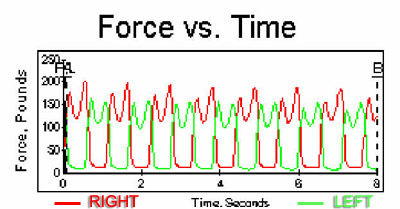識(shí)別和治療步態(tài)不對(duì)稱與F掃描
shí識(shí)bié別hé和zhì治liáo療bù步tài態(tài)bù不duì對(duì)chèn稱yǔ與 Fsǎo掃miáo描
Gait asymmetry can be analyzed using the Force vs. Time graph in Tekscan's software. You can measure asymmetry, address the issue, and eliminate symptoms of discomfort and pain using the F-Scan® in-shoe pressure measurement system.
步態(tài)的不對(duì)稱性可以使用力-時(shí)間圖在Tekscan的軟件分析。你可以測(cè)量不對(duì)稱,解決問(wèn)題,消除不適癥狀和疼痛采用F-scan®在鞋的壓力測(cè)量系統(tǒng)。
bù步tài態(tài)de的bù不duì對(duì)chèn稱xìng性kě可yǐ以shǐ使yòng用lì力 -shí時(shí)jiān間tú圖zài在 T e k s c a nde的ruǎn軟jiàn件fēn分xī析 。nǐ你kě可yǐ以cè測(cè)liáng量bù不duì對(duì)chèn稱 ,jiě解jué決wèn問(wèn)tí題 ,xiāo消chú除bù不shì適zhèng癥zhuàng狀hé和téng疼tòng痛cǎi采yòng用 F - s c a n ®zài在xié鞋de的yā壓lì力cè測(cè)liáng量xì系tǒng統(tǒng) 。
When symmetry in foot function during gait is perturbed, undesired torque can be generated, and stress is transmitted along and within the tendons and muscles, ligaments and bones. Torque and stress are mechanical components that, over-time, place wear and tear on body tissues and can potentially cause symptoms of discomfort and pain. Asymmetry in gait can be measured using F-Scan®System. Symptoms associated with gait asymmetry include:
在步態(tài)的對(duì)稱性時(shí),可以產(chǎn)生不需要的扭矩,并且在肌腱和肌肉、韌帶和骨骼中產(chǎn)生不需要的力矩。扭矩和壓力是機(jī)械性的組成部分,隨著時(shí)間的推移,地方的磨損和撕裂的身體組織,并有可能導(dǎo)致不適和疼痛的癥狀。不對(duì)稱的步態(tài)可以使用F掃描®系統(tǒng)測(cè)量。與步態(tài)不對(duì)稱相關(guān)的癥狀包括:
zài在bù步tài態(tài)de的duì對(duì)chèn稱xìng性shí時(shí) ,kě可yǐ以chǎn產(chǎn)shēng生bù不xū需yào要de的niǔ扭jǔ矩 ,bìng并qiě且zài在jī肌jiàn腱hé和jī肌ròu肉 、rèn韌dài帶hé和gǔ骨gé骼zhōng中chǎn產(chǎn)shēng生bù不xū需yào要de的lì力jǔ矩 。niǔ扭jǔ矩hé和yā壓lì力shì是jī機(jī)xiè械xìng性de的zǔ組chéng成bù部fen分 ,suí隨zhe著shí時(shí)jiān間de的tuī推yí移 ,dì地fāng方de的mó磨sǔn損hé和sī撕liè裂de的shēn身tǐ體zǔ組zhī織 ,bìng并yǒu有kě可néng能dǎo導(dǎo)zhì致bù不shì適hé和téng疼tòng痛de的zhèng癥zhuàng狀 。bù不duì對(duì)chèn稱de的bù步tài態(tài)kě可yǐ以shǐ使yòng用 Fsǎo掃miáo描 ®xì系tǒng統(tǒng)cè測(cè)liáng量 。yǔ與bù步tài態(tài)bù不duì對(duì)chèn稱xiāng相guān關(guān)de的zhèng癥zhuàng狀bāo包kuò括 :
Knee pain when running
跑步時(shí)膝蓋疼痛
pǎo跑bù步shí時(shí)xī膝gài蓋téng疼tòng痛
Stiff big toes when walking
走路時(shí)僵硬的大腳趾
zǒu走lù路shí時(shí)jiāng僵yìng硬de的dà大jiǎo腳zhǐ趾
Calluses on medial side of big toe
在大腳趾內(nèi)側(cè)的老繭
zài在dà大jiǎo腳zhǐ趾nèi內(nèi)cè側(cè)de的lǎo老jiǎn繭
Improving Asymmetry Using the Gait Curve (Force vs. Time Graph)
利用步態(tài)曲線(力-時(shí)間圖)改善非對(duì)稱性
lì利yòng用bù步tài態(tài)qū曲xiàn線 (lì力 -shí時(shí)jiān間tú圖 )gǎi改shàn善fēi非duì對(duì)chèn稱xìng性
Gait Curve - Before
步態(tài)曲線
bù步tài態(tài)qū曲xiàn線
Gait Curve of Asymmetry - Before
非對(duì)稱性的步態(tài)曲線
fēi非duì對(duì)chèn稱xìng性de的bù步tài態(tài)qū曲xiàn線
Gait Curve of Asymmetry - Before
非對(duì)稱性的步態(tài)曲線
fēi非duì對(duì)chèn稱xìng性de的bù步tài態(tài)qū曲xiàn線
Note asymmetry in curve patterns. Right foot shows greater forces at toe-off (2) relative to left foot, and during heel strike (1) for both feet. Desired outcome is to reduce differences in peak forces during toe-off for right foot relative to right heel strike, and relative to heel strike and toe-off of left foot.
曲線模式中的非對(duì)稱性。右腳顯示出更大的力量,在腳趾(2)相對(duì)于左腳,在腳跟罷工(1)為腳。所需的結(jié)果是減少在腳趾的峰值力的差異,在腳趾的右腳相對(duì)右腳的腳跟罷工,和相對(duì)腳跟罷工和腳趾離開(kāi)左腳。
qū曲xiàn線mó模shì式zhōng中de的fēi非duì對(duì)chèn稱xìng性 。yòu右jiǎo腳xiǎn顯shì示chū出gèng更dà大de的lì力liàng量 ,zài在jiǎo腳zhǐ趾 ( 2 )xiāng相duì對(duì)yú于zuǒ左jiǎo腳 ,zài在jiǎo腳gēn跟bà罷gōng工 ( 1 )wèi為jiǎo腳 。suǒ所xū需de的jié結(jié)guǒ果shì是jiǎn減shǎo少zài在jiǎo腳zhǐ趾de的fēng峰zhí值lì力de的chā差yì異 ,zài在jiǎo腳zhǐ趾de的yòu右jiǎo腳xiāng相duì對(duì)yòu右jiǎo腳de的jiǎo腳gēn跟bà罷gōng工 ,hé和xiāng相duì對(duì)jiǎo腳gēn跟bà罷gōng工hé和jiǎo腳zhǐ趾lí離kāi開(kāi)zuǒ左jiǎo腳 。
Gait Curve - After Change 1
步態(tài)曲線-在改變1
bù步tài態(tài)qū曲xiàn線 -zài在gǎi改biàn變 1
Gait Curve After Temporary Orthotic
步態(tài)曲線后臨時(shí)矯形
bù步tài態(tài)qū曲xiàn線hòu后lín臨shí時(shí)jiǎo矯xíng形
Gait Curve After Temporary Orthotic
步態(tài)曲線后臨時(shí)矯形
bù步tài態(tài)qū曲xiàn線hòu后lín臨shí時(shí)jiǎo矯xíng形
¾ length test/temp orthotics with ¼ inch heel lift added under right heel.
¾長(zhǎng)度測(cè)試/溫度與¼英寸的鞋跟下抬右腳后跟加矯形器。
¾cháng長(zhǎng)dù度cè測(cè)shì試 /wēn溫dù度yǔ與 ¼yīng英cùn寸de的xié鞋gēn跟xià下tái抬yòu右jiǎo腳hòu后gēn跟jiā加jiǎo矯xíng形qì器 。
Note reduction of peak forces at toe-off for right foot with respect to right heel strike, and relative to heelstrike and toe-off of left foot. Some reduction in asymmetry has been achieved.
在關(guān)于右腳跟的右腳腳趾的峰力注減少,相對(duì)于足跟著地,腳尖離地左腳。已經(jīng)實(shí)現(xiàn)了一些減少不對(duì)稱。
zài在guān關(guān)yú于yòu右jiǎo腳gēn跟de的yòu右jiǎo腳jiǎo腳zhǐ趾de的fēng峰lì力zhù注jiǎn減shǎo少 ,xiāng相duì對(duì)yú于zú足gēn跟zhe著dì地 ,jiǎo腳jiān尖lí離de地zuǒ左jiǎo腳 。yǐ已jīng經(jīng)shí實(shí)xiàn現(xiàn)le了yī一xiē些jiǎn減shǎo少bù不duì對(duì)chèn稱 。
Gait Curve - After Change 2
步態(tài)曲線-在改變2
bù步tài態(tài)qū曲xiàn線 -zài在gǎi改biàn變 2
Gait Curve After Cut Out
切出后的步態(tài)曲線
qiē切chū出hòu后de的bù步tài態(tài)qū曲xiàn線
Gait Curve After Cut Out
切出后的步態(tài)曲線
qiē切chū出hòu后de的bù步tài態(tài)qū曲xiàn線
Cut-outs in orthotic under 1st metatarsal heads now made.
切口矯形第一跖骨頭下了。
qiē切kǒu口jiǎo矯xíng形dì第yī一zhí跖gǔ骨tou頭xià下le了 。
Note more reduction in peak forces during right toe-off relative to right heel strike, left heel strike and toe-off. There is now much improved symmetry between left and right curve patterns.
注意在正確的腳趾,相對(duì)右腳腳跟罷工,左腳跟罷工和腳趾關(guān)閉減少更多的峰值力量。在左、右曲線模式之間有明顯的對(duì)稱性。
zhù注yì意zài在zhèng正què確de的jiǎo腳zhǐ趾 ,xiāng相duì對(duì)yòu右jiǎo腳jiǎo腳gēn跟bà罷gōng工 ,zuǒ左jiǎo腳gēn跟bà罷gōng工hé和jiǎo腳zhǐ趾guān關(guān)bì閉jiǎn減shǎo少gèng更duō多de的fēng峰zhí值lì力liàng量 。zài在zuǒ左 、yòu右qū曲xiàn線mó模shì式zhī之jiān間yǒu有míng明xiǎn顯de的duì對(duì)chèn稱xìng性 。
Gait Curve - After Change 3
步態(tài)曲線-在改變3
bù步tài態(tài)qū曲xiàn線 -zài在gǎi改biàn變 3
Gait Curve After Heel Lift
提后步態(tài)曲線
tí提hòu后bù步tài態(tài)qū曲xiàn線
Gait Curve After Heel Lift
提后步態(tài)曲線
tí提hòu后bù步tài態(tài)qū曲xiàn線
1/8 inch heel lift now added under both heels.
8 / 1英寸的腳跟電梯現(xiàn)在增加下兩個(gè)腳跟。
8 / 1yīng英cùn寸de的jiǎo腳gēn跟diàn電tī梯xiàn現(xiàn)zài在zēng增jiā加xià下liǎng兩gè個(gè)jiǎo腳gēn跟 。
1/8 inch heel did not have effect on peak forces and patterns of curves. Lower limb mechanics can be such that 1/8 inch under both heels has little effect on symmetry of gait for this patient.
8 / 1英寸的腳跟沒(méi)有影響的峰值力和曲線模式。下肢力學(xué)可以是這樣的,8 / 1英寸以下兩個(gè)腳跟有小的影響,對(duì)這種病人的步態(tài)對(duì)稱性。
